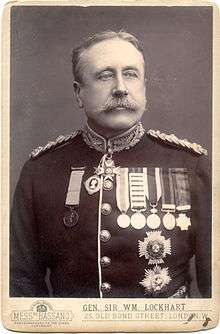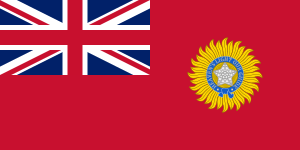William Lockhart (Indian Army officer)
General Sir William Stephen Alexander Lockhart GCB KCSI (2 September 1841 – 18 March 1900) was a British General.
Sir William Lockhart | |
|---|---|
 | |
| Born | 2 September 1841 |
| Died | 18 March 1900 (aged 58) |
| Allegiance | |
| Service/ | |
| Years of service | 1858 - 1900 |
| Rank | General |
| Commands held | British Indian Army |
| Awards | Knight Grand Cross of the Order of the Bath Knight Commander of the Order of the Indian Empire |
Military career
Lockhart was born at the Manse in Inchinnan, Renfrewshire, Scotland, where his father Dr Laurence Lockhart D.D. was the minister. He was educated at the Glasgow Academy. Lockhart's uncle was John Gibson Lockhart, eminent writer, poet and biographer of Sir Walter Scott. His mother Louisa was a daughter of David Blair, a manufacturer in Glasgow.[1]
He entered the Indian Army in 1858, in the 44th Bengal Native Infantry. He served in the last months of the Indian Mutiny, the Bhutan Campaign (1864–66), under Napier in the Abyssinian Expedition (1867–68; mentioned in dispatches) and the Hazara Black Mountain Expedition (1868–69; mentioned in dispatches).[2]
From 1869 to 1879 he acted as Deputy Assistant and Assistant Quartermaster General in Bengal. In 1877 he was military attaché with the Dutch Army in Acheen (modern Aceh). Here he saw active service [3] and received the Dutch Expedition Cross.[4] He was Road Commandant of the Khyber Pass and served in the Second Anglo-Afghan War of 1878–80, was mentioned in dispatches and made a CB, and from 1880 to 1885 he was Deputy Quartermaster-General in the Intelligence Branch at headquarters. Between 1885 and 1886 he headed the Lockhart Mission surveying the Hindu Kush. He commanded a brigade in the Third Burmese War (1886–87), and was made KCB and CSI and received the thanks of the government.[2]
An attack of fever brought Lockhart to England in 1888, where he was employed as Assistant Military Secretary for Indian affairs (at Horse Guards); but in 1890 he returned to India earlier than planned to become Commander-in-Chief Punjab Command. He set up his home in Abbottabad[5] and for five years was engaged in various expeditions against the hill tribes. After the Waziristan Campaign in 1894–95 he was made KCSI. He became a full general in 1896, and in 1897 he was given the command against the Afridis and Mohmands, and conducted the difficult Tirah Expedition with great skill.[2]
He returned to England in 1898 and was made GCB, and was appointed Commander-in-Chief, India and, after a brief visit to Scotland, returned to India. He took up residence in 'Treasury Gate', Fort William, India and at 'Snowdon' in Simla when the government migrated to the hill station for the summer months.[6]
Death
He died of malaria whilst serving in office in Calcutta on 18 March 1900. His funeral occurred the following day and the service was taken by James Welldon the Bishop of Calcutta, and former headmaster of Harrow School. Lockhart's good friend Lord Curzon (The Viceroy) attended the funeral. Lockhart married twice.[1]
A private collection funded a fine memorial in St Giles' Cathedral, Edinburgh and soldiers and their families paid for the construction of an obelisk in Roomi Park, Rawalpindi (now Pakistan).[7]
References
-

-

- Byron Farwell. Queen Victoria's Little Wars. p. 319. Published Allen Lane, London. 1973.
- Confirmed by medals worn by Lockhart in both portrait photo above and St Giles Cathedral memorial
- He had in fact built a house in that North-West Cantonment town earlier in the 1870s, where he and his family and friends used to stay, including John Lockwood Kipling
- "Lockhart, Sir William Stephen Alexander". Oxford Dictionary of National Biography. Retrieved 23 March 2020.
- "'Threatened' by a pool, RCB to convert park into restaurant". Dawn News. 3 July 2014. Retrieved 23 March 2020.
Further reading
- General Sir William Stephen Alexander Lockhart Soldier of the Queen Empress by Martin Smith ISBN 978-0-9570154-0-1
| Military offices | ||
|---|---|---|
| Preceded by Sir Charles Nairne |
Commander-in-Chief, India 1898–1900 |
Succeeded by Sir Arthur Palmer |
.svg.png)
